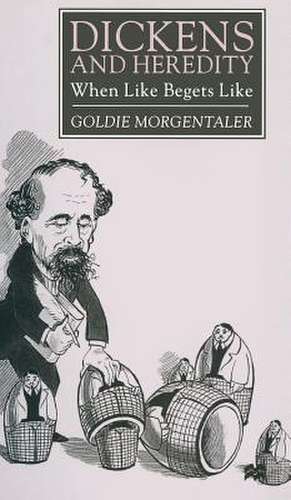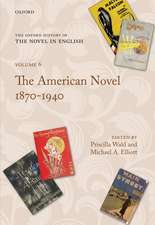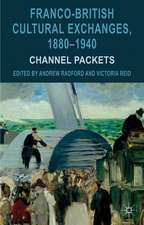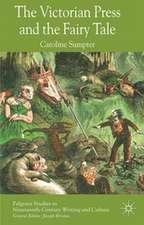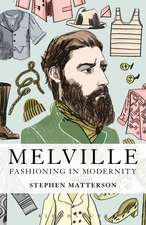Dickens and Heredity: When Like Begets Like
Autor G. Morgentaleren Limba Engleză Hardback – 10 noi 1999
Preț: 638.43 lei
Preț vechi: 751.10 lei
-15% Nou
Puncte Express: 958
Preț estimativ în valută:
122.16€ • 133.11$ • 102.94£
122.16€ • 133.11$ • 102.94£
Carte tipărită la comandă
Livrare economică 23 aprilie-07 mai
Preluare comenzi: 021 569.72.76
Specificații
ISBN-13: 9780333747230
ISBN-10: 0333747232
Pagini: 221
Ilustrații: XVI, 221 p.
Dimensiuni: 127 x 203 x 14 mm
Greutate: 0.36 kg
Ediția:2000
Editura: Palgrave Macmillan UK
Colecția Palgrave Macmillan
Locul publicării:London, United Kingdom
ISBN-10: 0333747232
Pagini: 221
Ilustrații: XVI, 221 p.
Dimensiuni: 127 x 203 x 14 mm
Greutate: 0.36 kg
Ediția:2000
Editura: Palgrave Macmillan UK
Colecția Palgrave Macmillan
Locul publicării:London, United Kingdom
Cuprins
Introduction Whatever Lives Inherits: An Historical Overview of the Hereditary Puzzle PART 1: HEREDITY AND THE INDIVIDUAL The Inheritance of Goodness: The Early Books The Inheritance of Goodness: David Copperfield and Pip Illegitimacy and Villainy: The Negative Aspects of Heredity PART 2: THE PUBLIC FACES OF HEREDITY Heredity, Class and Race After The Origin: The Last Three Novels A Few Last Words Endnotes Index
Recenzii
'In Dickens and Heredity Goldie Morgentaler not only draws attention to a little-studied aspect of this continuingly popular Victorian novelist, his fascination with heredity and his constant deployment of amazing resemblances between children and parents, but also delineates the contemporary theories of heredity which had an impact on his fiction.' - Galton Institute Newsletter
'Dickens is usually seen as a writer whose characters are connected to their social backgrounds...But this book, by showing that especially in his early work Dickens placed importance on inherited traits rather than environment, strikes down this preconception...Morgentaler is at her best when she offers insightful readings of the novels...some of the analysis, such as the examination of A Tale of Two Cities or Our Mutual Friend, makes for fanscinating reading.' - Wendy Thatcher, Montreal Gazette
The result of [Morgentaler's] thoughtful, intelligent planning is a well grounded, substantial book...Profiting from an observation of Queenie Leavis that David Copperfield illustrates the new scientific interest in heredity characteristic of Victorian literature, and a corresponding new interest in what determines conduct, Morgentaler sets herself to locate that scientific interest, to trace its historical roots in the ancients, in Harvey, Jacob, and Linnaeus (among others), and to factor in the concept of the Great Chain of Being, and notions on the subject reflected in popular and literary culture of the early nineteenth century. I do her argument no favor by rehashing it here, but you should know that from her survey she formulates two abstract models, her simplification of the complex metaphor of hereditary transmission...This is a book Dickensians will love at first reading and will want in their libraries to leaf through again.' - Patrick McCarthy, University of California, Santa Barbara, Editor, Dickens Forum
'Dickens is usually seen as a writer whose characters are connected to their social backgrounds...But this book, by showing that especially in his early work Dickens placed importance on inherited traits rather than environment, strikes down this preconception...Morgentaler is at her best when she offers insightful readings of the novels...some of the analysis, such as the examination of A Tale of Two Cities or Our Mutual Friend, makes for fanscinating reading.' - Wendy Thatcher, Montreal Gazette
The result of [Morgentaler's] thoughtful, intelligent planning is a well grounded, substantial book...Profiting from an observation of Queenie Leavis that David Copperfield illustrates the new scientific interest in heredity characteristic of Victorian literature, and a corresponding new interest in what determines conduct, Morgentaler sets herself to locate that scientific interest, to trace its historical roots in the ancients, in Harvey, Jacob, and Linnaeus (among others), and to factor in the concept of the Great Chain of Being, and notions on the subject reflected in popular and literary culture of the early nineteenth century. I do her argument no favor by rehashing it here, but you should know that from her survey she formulates two abstract models, her simplification of the complex metaphor of hereditary transmission...This is a book Dickensians will love at first reading and will want in their libraries to leaf through again.' - Patrick McCarthy, University of California, Santa Barbara, Editor, Dickens Forum
Notă biografică
Goldie Morgentaler is Assistant Professor of English at the University of Lethbridge in Alberta, Canada.
